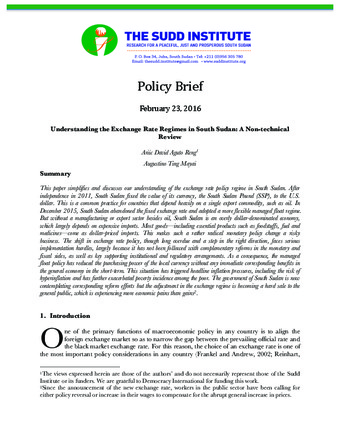Understanding the Exchange Rate Regimes in South Sudan: A Non-technical Review

Authors: Ariic David Aguto Reng, Augustino Ting Mayai
Organization: The Sudd Institute
Type: Policy Briefs
Date: 23/02/2016
Publication Summary
This paper simplifies and discusses our understanding of the exchange rate policy regime in South Sudan. After independence in 2011, South Sudan fixed the value of its currency, the South Sudan Pound (SSP), to the U.S. dollar. This is a common practice for countries that depend heavily on a single export commodity, such as oil. In December 2015, South Sudan abandoned the fixed exchange rate and adopted a more flexible managed float regime. But without a manufacturing or export sector besides oil, South Sudan is an overly dollar-denominated economy, which largely depends on expensive imports. Most goods—including essential products such as foodstuffs, fuel and medicines—come as dollar-priced imports. This makes such a rather radical monetary policy change a risky business. The shift in the exchange rate policy, though long overdue and a step in the right direction, faces serious implementation hurdles, largely because it has not been followed with complementary reforms in the monetary and fiscal sides, as well as key supporting institutional and regulatory arrangements. As a consequence, the managed float policy has reduced the purchasing power of the local currency without any immediate corresponding benefits in the general economy in the short-term. This situation has triggered headline inflation pressures, including the risk of hyperinflation and has further exacerbated poverty incidence among the poor. The government of South Sudan is now contemplating corresponding reform efforts but the adjustment in the exchange regime is becoming a hard sale to the general public, which is experiencing more economic pains than gains.
Ariic David Aguto Reng's Biography
Ariic David Aguto Reng holds a bachelor of Management (Financial Economics) from the University of Toronto and a Master of Arts in Economics. He has a wealth of professional experience working in the public and the private sectors. He has worked for the Canadian Revenue Agency (CRA), The Ontario Ministry of Agriculture & Rural Affairs, Directorate of Economic Innovation. More recently with Deloitte Consulting LLP, he was an Analyst for a USAID-funded project aimed at creating macroeconomic stability and promoting core economic governance within Ministry of Finance and Economic Planning (MOFEP), Bank of South Sudan (BOSS), and the Ministry of Petroleum and Mining (MPMI). He is currently the Business Manager of the Eye Radio where he is managing and implementing a USAID-funded media development grant in South Sudan. Mr. Ariic is also an Associate Lecturer at the University of Juba where he teaches Fiscal Management in the Public Sector at the School of Public Service (SPS).
Augustino Ting Mayai's Biography
Augustino Ting Mayai is the former Managing Director of the Sudd Institute. He is a founding Research Director of the same institution, serving in this capacity for a decade. He holds a Ph.D. in Sociology, with concentrations on demography and development from the University of Wisconsin-Madison. He currently studies how state effectiveness affects child health outcomes in South Sudan and Ethiopia. Dr. Mayai has written extensively on South Sudan’s current affairs. August is the current Chair (Statistician General) of the National Bureau of Statistics, Government of South Sudan.
